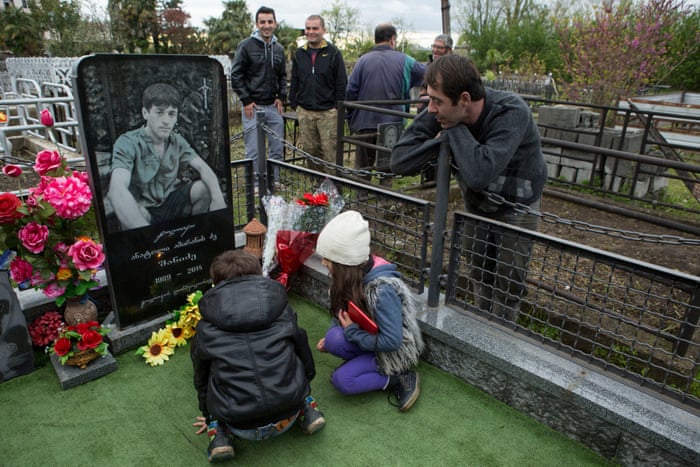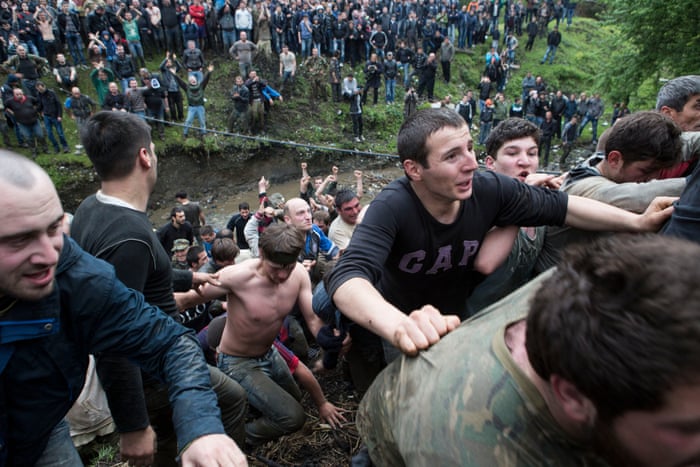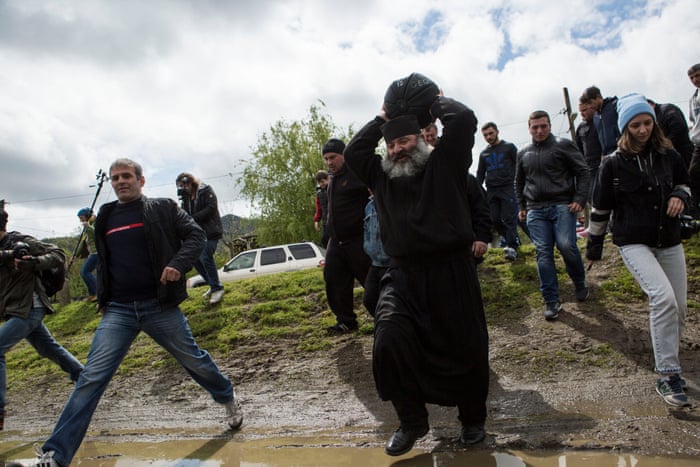Game of Cemeteries
"The ball becomes a relic, a symbol of victory, respect. That is why we do our best."
"I wish we were not in a situation where my brother needed a ball."
Vakhtang Torotadze, Shukhuti, Georgia
 |
After the match, the ball is brought to the grave of the person who died most recently in the village. And that’s it – at least for another year • All photographs by Giorgi Gogua for RFE/RL |
In Shukhuti western Georgia each spring, a black leather ball is sewn together so that residents can play a folk game called Lelo Burti. The game is brutal. It is a blend of large-scale rugby linked to a resulting larger street brawl; once popular all about the region of Guria, now only played in Shukhuti, once a year, Orthodox Easter.
The only equipment required for the game to proceed is the ball which will become a trophy. A trophy that is claimed by the winning team. And as a trophy it is destined to end up at the grave of their choice. The choice being to honour an individual's memory. The game itself had been granted status as a "nonmaterial monument" of culture by the government of Georgia, five years ago.
The village of Shukhuti is split into Upper and Lower Shukhuti on game day. Men representing each of the halves compete to carry the ball to their side of town. With success, the game ends. And usually the struggle to succeed in bringing the ball to one side or the other of the town, takes a big effort and a long time.
 |
With no boundaries, no limit to the participation number and extemporaneous rules other than that women rarely play though they are not prohibited from doing so, the game can last a few hours, although on occasion it continues on into the night hours. Balls from games going back decades are scattered around the Shukhuti cemetery honouring various individuals.
Vakhtang Chkhatarashvili, 54, in mourning for his son Mishiko, treasures the ball at his son's gravesite. Mishiko was killed in a car accident in 2014, just as he turned 18. Soon afterward, the Lower Shukhuti team played the Lelo Burti game in his honour, winning it with the help of his friends. And at his gravesite sits the ball on a metal stand. "Taking care of the ball means taking care of my boy", said his father.
Over a dozen men representing both sides of the village gathered for a Georgian feast, a supra, the night before this year's game. Large quantities of meat were consumed, wine and chacha, a Georgian grape liquor as well. The memories of Vitaly Torotadze, being honoured by Upper Shukhuti this year and Aleko Dolidze of Lower Shukhuti, were toasted, each of whose gravesites were candidates for the game's ball.
 |
| Once the ball is ready, it’s brought to the local church. Two teams play: the objective is to push the ball into the opposing team’s end of the village. Whoever does it first, wins |
The ball would be filled with dirt to the weight of 15 kilograms the following morning, blessed with wine by the local priest, Father Saba, and at 5 o'clock in the afternoon, Father Saba left the church with the ball, took a running start and heaved it into the air. From all sides, bodies crashed together to take possession of the ball as it disappeared under flesh and swirling dirt.
At times the heaving scrum consisted of a hundred people. They crashed against the front of one of the village's few stores, cracking the glass, careened down the hill from the main road into a thicket of trees with men scrambling in and out of the action, gasping for breath, shirts torn, shoes kicked away. An ambulance drove off with one of the players.
Upper Shukhuti established an advantage just past 6 p.m. In the final stretch, the players broke free and brought the ball across the creek representing the goal line. This time it took but an hour and 40 minutes for the game to conclude. And when it did, the men of Upper Shukhuti marched toward the cemetery with their ball.
At Vitaly Torotadze's grave the ball was placed beneath his headstone as his widow hugged her late husband's gravestone, before she rose to set out a feast it had taken her three days to prepare.
 |
| Dating back 300 years, the sport was once played all across the country. Now held just once a year in one village, it still attracts large crowds and plenty of injuries The Guardian |
Labels: Cemeteries, Georgia, Tournament Game

<< Home